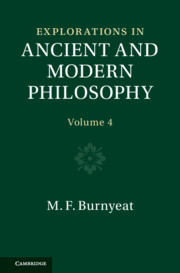Book contents
- Explorations in Ancient and Modern Philosophy
- Explorations in Ancient and Modern Philosophy
- Copyright page
- Contents
- Illustrations
- Preface
- Acknowledgements
- Abbreviations
- Introduction
- Part I Ontology and epistemology
- Part II Physics and optics
- Chapter 8 ΕΙΚΩΣ ΜΥΘΟΣ
- Chapter 9 Aristotle on the foundations of sublunary physics
- Chapter 10 Archytas and optics
- Chapter 11 ‘All the world’s a stage-painting’: scenery, optics, and Greek epistemology
- Bibliography
- Index locorum
Chapter 10 - Archytas and optics
from Part II - Physics and optics
Published online by Cambridge University Press: 24 March 2022
- Explorations in Ancient and Modern Philosophy
- Explorations in Ancient and Modern Philosophy
- Copyright page
- Contents
- Illustrations
- Preface
- Acknowledgements
- Abbreviations
- Introduction
- Part I Ontology and epistemology
- Part II Physics and optics
- Chapter 8 ΕΙΚΩΣ ΜΥΘΟΣ
- Chapter 9 Aristotle on the foundations of sublunary physics
- Chapter 10 Archytas and optics
- Chapter 11 ‘All the world’s a stage-painting’: scenery, optics, and Greek epistemology
- Bibliography
- Index locorum
Summary
This paper is detective work. I aim to show that the brilliant Pythagorean mathematician Archytas of Tarentum was the founder of ancient Greek mathematical optics. The evidence is indirect. (1) A fragment of Aristotle preserved in Iamblichus is one of two doxographical notices to mention Pythagorean work in optics. (2) Apuleius credits Archytas with a theory of visual rays which saves the principle that the angle of reflection is equal to the angle of incidence. I argue that the source from which Apuleius got this information was the Catoptrics of Archimedes, the genuineness of which I defend against Knorr’s hypothesis that it is the Euclidean Catoptrics, which had been misattributed to Archimedes. (3) The omission of optics from the mathematical curriculum in Plato’s Republic, and the Timaeus’ wholly physical account of mirror images, can be explained as polemical, for it is well attested that optics was practised in the Academy. The reason Plato does not mention optics is that he objected to Archytas using mathematics to understand the physical world rather than to transcend it.
- Type
- Chapter
- Information
- Explorations in Ancient and Modern Philosophy , pp. 305 - 324Publisher: Cambridge University PressPrint publication year: 2022

